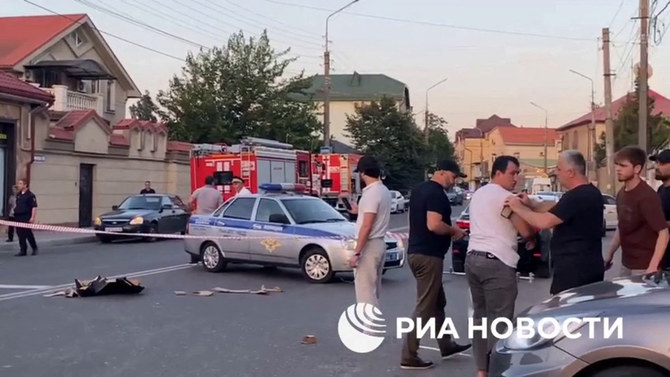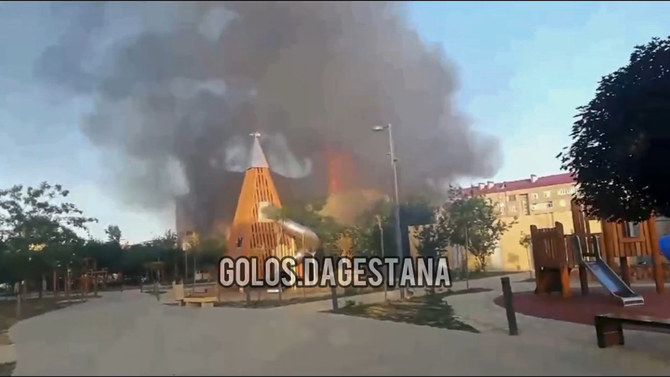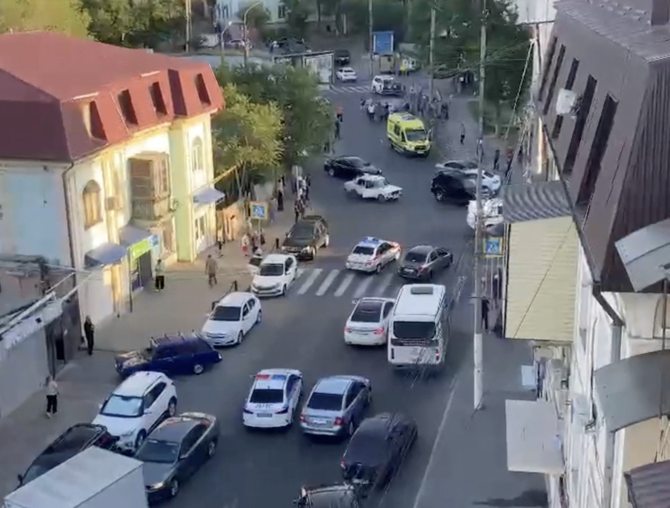MOSCOW: Gunmen opened fire at a synagogue, an Orthodox church and a police post in attacks across two cities in Russia’s North Caucasus region of Dagestan on Sunday, killing an Orthodox priest and multiple police officers, the region’s head said.
“This is a day of tragedy for Dagestan and the whole country,” Sergei Melikov, governor of the Dagestan region, said in a video published early on Monday on the Telegram messaging app.
Melikov said that more than 15 police officers “fell victim” to what he said was a “terrorist attack,“” but he did not specify how many of the police were killed and how many were injured. Russia’s Interfax agency reported that at least 15 police officers were killed.
The simultaneous attacks across the cities of Makhachkala and Derbent came three months after 145 people were killed in an attack claimed by the Daesh (Islamic State) on a concert hall near Moscow, Russia’s worst terrorist attack in years.
There was no immediate claim of responsibility for the attacks in the volatile North Caucasus region.
“We understand who is behind the organization of the terrorist attacks and what goal they pursued,” Melikov said, without disclosing further details.
Six of the gunmen were shot and killed as the incidents unfolded, Melikov said. Russian state news agencies cited the National Anti-Terrorist Committee as saying that five of the gunmen had been killed.
Russia’s state media cited law enforcement as saying that among the attackers had been two sons of the head of central Dagestan’s Sergokala district, who had been detained by investigators.
Melikov said that among the dead, in addition to the police officers, were several civilians, including an Orthodox priest who worked in Derbent for more than 40 years. A spokesman for the Russian Orthodox Church said on Telegram that the priest, Nikolai Kotelnikov, was “brutally murdered.”
Dagestan’s RGVK broadcaster said Kotelnikov had served more than 40 years in Derbent.
“The synagogue in Derbent is on fire,” the chairman of the public council of Russia’s Federation of Jewish Communities, Boruch Gorin wrote on Telegram.
“It has not been possible to extinguish the fire. Two are killed: a policeman and a security guard.”
He added: “The synagogue in Makhachkala has also been set on fire and burnt down.”
Days of mourning
June 24-26 have been declared days of mourning in Dagestan, Melikov said, with flags lowered to half-staff and all entertainment events canceled.
The restive region was in the 2000s hit by an Islamist insurgency spilling over from neighboring Chechnya, with Russian security forces moving aggressively to combat extremists in the region.
In recent years, attacks had become rarer, with Russia’s Federal Security Service (FSB) saying in 2017 that it had defeated the insurgency in the region.
The agencies reported exchanges of gunfire in the center of Makhachkala. They cited the interior ministry as saying that exits from the Caspian Sea port of around 600,000 had been closed, and that conspirators who were still at large may yet attempt to flee the city.
About 125 km (75 miles) south of Makhachkala, gunmen attacked a synagogue and a church in Derbent, home to an ancient Jewish community and a UNESCO World Heritage site. Authorities were quoted as saying that both the synagogue and church were ablaze, and that two attackers had been killed.
Russian media cited the head of the country’s federation of Jewish communities as calling for people to avoid reacting to “provocations.”
In Israel, the Foreign Ministry said the synagogue in Derbent had been burned to the ground and shots had been fired at a second synagogue in Makhachkala. The statement said it was believed there were no worshippers in the synagogue at the time.
Russian authorities have pointed to militant Muslim elements in previous incidents in the region.
In October, after the war in Gaza broke out, rioters waving Palestinian flags broke down glass doors and rampaged through Makhachkala airport to look for Jewish passengers on a flight arriving from Tel Aviv.
Russian President Vladimir Putin accused the West and Ukraine of stirring up unrest inside Russia in connection with the incident.
Russia’s FSB security service in April said it had arrested four people in Dagestan on suspicion of plotting a deadly attack on Moscow’s Crocus City Hall concert venue in March, which was claimed by Daesh.
Militants from Dagestan are known to have traveled to join the Daesh group in Syria.
In 2015, the group declared it had established a “franchise” in the North Caucasus.
Dagestan lies east of Chechnya where Russian authorities battled separatists in two brutal wars, first in 1994-1996 and then in 1999-2000.
After the defeat of Chechen insurgents, Russian authorities have been locked in a simmering conflict with militants from across the North Caucasus that has killed scores of civilians and police.






























